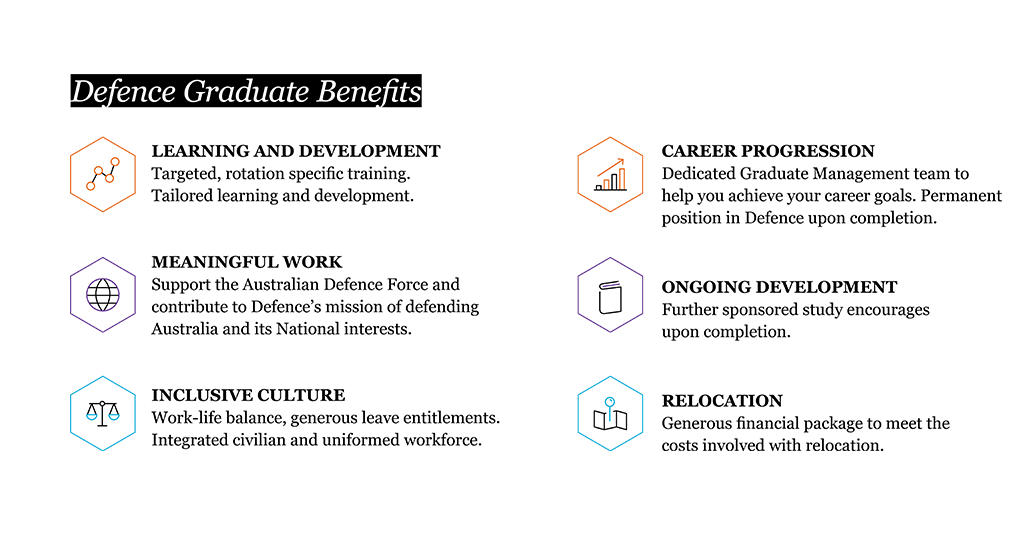Department of Defence
Defence Graduate Program - Logistics Stream
Opportunity expired
Opportunity details
- Graduate Job or Program
- $68,442 pa + 15.4% superannuation. Upon successful completion of the program, graduates will advance to APS 5: $76,611 pa + 15.4% superannuation.
- Apply by 18 Apr 2020

Whilst logistics in the private sector has a heavy focus on transport, warehousing, distribution and manufacturing, a career as a logistician in Capability, Acquisition and Sustainment Group (CASG) delivers much more.
As a Materiel logistician, you will undertake a diverse range of activities in support of the Australian Defence Force, and their Capability Managers. As a graduate on the 18-month Defence Capability Pathway, you will undertake three rotations (of 6 months), at various locations around Australia, to gain a broad perspective of materiel logistics in Defence. These opportunities could see you providing logistics support anywhere from the concept stage of a new project at the start of the capability life cycle, through to transition into service, sustainment, upgrades and disposal.
As a Materiel logistician, you will have unique opportunities to work on some of the largest and most challenging acquisition and sustainment projects in Australia, for example:
Acquisition Projects
- Joint Strike Fighter for the Air Force
- New helicopters for the Navy and Army
- New Future Frigates and patrol boats for the Navy
- Advanced Growler Airborne Electronic Attack Capability for the Air Force
- Battlespace Communications Systems for the Army
- Anti-Ship Missile Defence systems for the Navy
Sustainment Activities
- F/A 18F Super Hornet
- Combat Clothing
- Weapons Systems
- Collins Class Submarines
- Communication Systems
- Armoured Vehicles
Your work as a Materiel logistician within CASG will be highly valued – the operational success of the Australian Defence Force depends on us.
Quick Details
Salary: $68,442 pa + 15.4% superannuation. Upon successful completion of the program, graduates will advance to APS 5: $76,661 pa + 15.4% superannuation.
Program: 18 months – 3 x 6 month rotations (one in Canberra)
Eligibility: Australian Citizens only
Location: Various (Canberra, Melbourne, Sydney, Adelaide, Brisbane, Perth, Newcastle).
Reviews
They are different every day but I have had the opportunity to draft emails, documents and undertake academic research as part of developing doctrinal policy.
- Document review, editing and drafting. - Handling correspondence for projects - Attending meetings - Stakeholder engagement (both internal and external)
Policy writing, decision making, liaising with other areas of Department . These roles and responsibilities are very rewarding
About the employer

Department of Defence
4.1
1,000 - 50,000 employees
Government & Public Service
Bring your unique skills and experiences to a world of opportunity at Defence.
Pros and cons of working at Department of Defence
Pros
Opportunity to learn and exposure to a vast array of experiences. Sense of pride in working on behalf of the Australian people and for the defence of the country.
The support for learning development opportunities and ongoing exposure to networking opportunities.
The department is very flexible when it comes to hours, including making ample arrangements to work from home if necessary.
I have had the opportunity to draft emails, documents and undertake academic research as part of developing doctrinal policy.
They are supportive and are good mentors in teaching the internal procedures that otherwise would not be shared if not directly exposed to them.
Cons
Workplace culture is heavily dependent on the dedication of the supervisors and senior leaders which varies depending on the work area.
When all workplace employees are working on-site there is often a shortage of desks which is inconvenient for all involved.
Can be very slow to hear updates.
There is a good mix of women, ethnic minorities, etc., but this seems to be very aggregated in certain groups/services—not so much integrated or dispersed across the department.
I am unsure of my current knowledge or capacity to comment on their sustainability efforts.